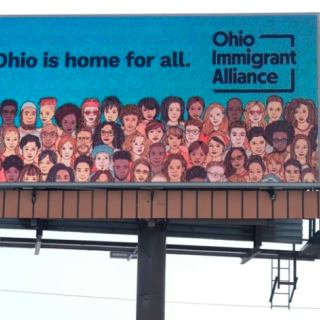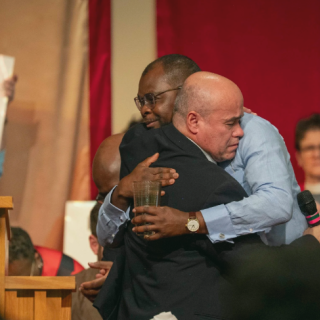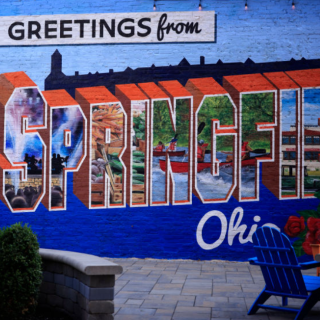Advertisement
I love music and, like I think anyone raised in America, loves a good celebration. It’s important, though, to keep in mind that many of the celebrations we hold come from having overcome extreme adversity. It’s also important to note the complexities of the people we celebrate.
The first official Martin Luther King Jr. national holiday was celebrated on Monday, January 20, 1986. I was five years old. The national push had hit its peak starting in late September of ‘80, when one of the greatest singer/songwriters of all time, Mr. Stevie Wonder, ended his album Hotter Than July with a track that includes the lyric:
“Because it should never be
Just because some cannot see
The dream as clear as he
That they should make it become an illusion.”
This lyric was clearly pointed at then-President Ronald Reagan, who only signed the holiday into law after a number of states (including this one) had already set the third Monday of January as a day in our slain leader’s honor and a chorus of people across the country demanded we codify the commemoration into law. Reading the writing on the wall, Reagan signed a law nationalizing the holiday in ‘83. It took another two years for the rest of the states to catch up.
We in Columbus have a long-term tension between uplifting King’s name while dishonoring his legacy on multiple fronts: our first Black mayor, Michael B. Coleman (elected in 1999), could rightfully boast that his administration hired Black people into the highest positions in city government. During his tenure, we had Black men leading the Fire Department, Division of Police, and the Department of Public Safety. At the time, our City Attorney was a Black woman. We certainly looked the part of having realized Dr. King’s dream.
The image of that dream gets a little murky after considering a few factors, though: It was under that Black leadership which first fought back a citizens’ call for the Department of Justice to engage in a pattern-and-practice investigation of the Columbus Division of Police for having killed, on average, 4 Black or Brown people, usually male, often in the back, since two years after Dr. King was killed.
The woman who’d served as the City Attorney at the time, Janet Jackson, is now the head of the Civilian Review Board. Under her leadership, that board recently voted to oust a member for “lack of neutrality” after watching a group of Proud Boys intimidate a school into cancelling an event that was to have featured drag queens reading holiday stories to a group of school children at the Universalist Unitarian Church in Clintonville.
The first time I ever heard Mayor Coleman’s voice in real time, he was in a booth at the Schottenstein Center. I was in a seat directly below him, watching my idol, Mr. Stevie Wonder, play most of Songs In The Key Of Life. In the middle of a set, Stevie actually called out to the former mayor, inviting him to come down from his VIP box and onto the stage.
“Hell – I’m going down there. Shiiiiit!”
The people around him laughed. Mayor Coleman was kidding; he didn’t go down to the stage. At the end of the night, I saw the former Mayor leave with the same friends he’d joked with. Instead of accepting an offer I personally would have crawled naked over broken glass to accept, Mr. Coleman, it seemed, was comfortable being able to say that he might have gone down if he wanted to. (Though whether he accepted that offer later or not is anyone’s guess.)
Mayor Coleman had probably been a law student at University of Dayton when Hotter Than July was released in ‘80. (I was born at the Miami Valley Hospital a little over a month later. The hospital and University share a property line now.) By the time “Happy Birthday” had made it into the households of nearly every Black household in America, Mr. Coleman was in private practice in a law firm partnered by Schottenstein, Zox & Dunn Co. – the Schottenstein family for whom the arena is named.
Mr. Coleman was born in late 1954 in Indianapolis – the same year Dr. King began his ministry at Ebenezer Baptist Church in Atlanta, GA. During the following year – 1955 – two things happened that would forever change the course of American history:
On August 28th, 14-year-old Emmett Till was beaten to death by two men in their thirties for allegedly flirting with one of their wives.
On December 5th, The Montgomery Bus Boycott began. The ultimate success of the boycott made Dr. King the most notable face of the Civil Rights movement at the time.
From that date until Dr. King’s assassination on April 4th, 1968, he had been arrested 29 times for everything from vagrancy to loitering to perjury.
On August 28th, 2022 – 67 years after Emmett Till’s murder – Mayor Coleman’s protege, current City Council President Shannon Hardin, and current City Attorney Zach Klein, had peaceful protestors arrested after they’d pitched tents on the officials’ front lawns. They had been protesting the abysmal treatment of Columbus’ houseless population.
Dr. King’s last campaign – launched in early ’68 – was known as the Poor People’s Campaign.
This Sunday – January 15, 2023 – is the date of the annual MLK breakfast and happens to correspond with Dr. King’s actual 93rd birthday. At the same event three years ago – this time on Monday, Martin Luther King Jr. Day, 2020 – two protestors were arrested after loudly interrupting Coleman’s successor, Andrew Ginther’s, speech. They were protesting the gross mishandling of the case of Julius Tate, a 17-year-old killed by Columbus Police in late 2017.
Mayor Coleman was in attendance at that event, as was President Hardin. Not a single public official who witnessed that brutal arrest made any public statement of substance. Stevie Wonder wrote of the holiday:
“It should be a great event
And the whole day should be spent
In full remembrance
Of those who lived and died for the oneness of all people.”
King also famously said that “Injustice Anywhere is a threat to justice everywhere.”
Every City Council President since Mr. Coleman’s last term as mayor, which ended in 2011, has either increasingly muffled that dissent or taken advantage of that attempted muffling. For his turn, Mayor Ginther pushed through an amendment to the City Charter hamstringing the citizen petition process; when our current City Attorney was in the seat, he implemented rules that made the interruption of a City Council meeting arrestable, set a laughably high limit on campaign finance contributions, and pushed through the false-flag Council “reform” measures through which Columbus voters will have to navigate this year.
In spite of seemingly having listened so intently during Zoom public hearings about the long-standing problems with policing in the wake of the 2020 protests, neither Hardin’s City Council, the Mayor’s office, The CRB, or the Black-female-led Columbus Division of Police have done anything of substance about the pattern Columbus police have of killing young Black people every quarter.
My favorite King quote, though, is probably this:
“I criticize America because I love her. I want her to stand as a moral example to the world.”
Two days after Hardin briefly earned the nickname “Get-off-my-lawn,” 20-year-old Donovan Lewis was shot in the stomach by Columbus Division of Police officer Ricky Anderson, killing the young man within minutes. It was 2 am at the time. Donovan had been asleep when the K-9 unit came to serve him a warrant. Here’s another zinger from the good doctor in August of ‘63, from a jail cell in Alabama:
“I must close now. But before closing I am impelled to mention one other point in your statement that troubled me profoundly. You warmly commended the Birmingham police force for keeping ‘order’ and ‘preventing violence.’ I don't believe you would have so warmly commended the police force if you had seen its angry violent dogs literally biting six unarmed, nonviolent Negroes.”
So far, Anderson is still on paid leave. No one in City Council has said anything in public about this.
Here’s one from a speech he gave in December of ‘63:
“It may be true that the law cannot make a man love me but it can keep him from lynching me and I think that is pretty important, also.”
In October of ‘22, 36-year-old Krieg Butler shot 13-year-old Sinzae Reed twice in the Wedgewood apartments and drove away. He was arrested and booked, then released a week later. Butler plead self-defense and was released by court order. The order was signed by Judge Mike McAllister.
Judge McCallister is Black. Sinzae and Donovan’s mothers are mixed, though the press continuously refers to the slain youths as Black.
Butler and Anderson are both white.
Of those five names, the two who died weren’t eligible to buy beer. The three living are each old enough to worry about their cholesterol levels.
Stevie was born in May of ’50 – 5 years before Till was murdered and Dr. King became a household name. Amid a huge, jubilant chorus, Stevie says this:
“We know the key to unity of all people
Is in the dream that you had so long ago
That lives in all of the hearts of people
That believe in unity
We'll make the dream become a reality
I know we will
Because our hearts tell us so.”
Many of our elected officials were at the MLK breakfast Sunday morning and will be at the march and reception celebrating MLK Day Monday afternoon going from the Statehouse to the Lincoln Theatre, in the heart of what Mayor Coleman’s administration vigorously marketed as the King-Lincoln District (though half of us still call it “Bronzeville”.)
I guarantee you Stevie’s song will be played during the event tomorrow and probably sung during the march. As much as I love the song and revere the man who wrote it, though, I’m not sure whether his optimism is warranted. I think the people who wanted to make the dream “become an illusion” were the very people who sold us said illusion as King’s dream in the first place.
After all, we have a majority Black leadership – even as our Black children are still beset upon by dogs and lynched in the street without consequence.
I wonder what Dr. King would say about this, after all?




